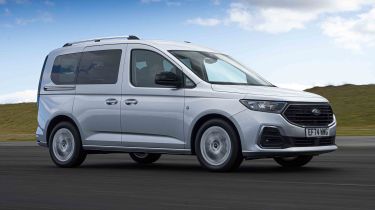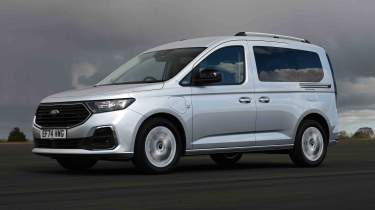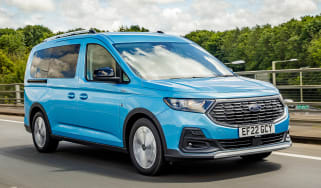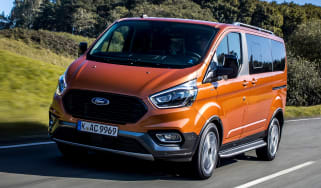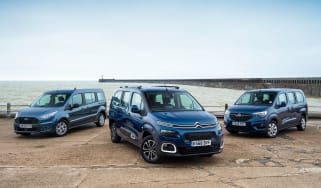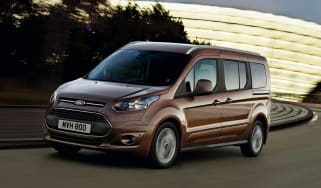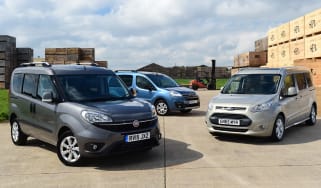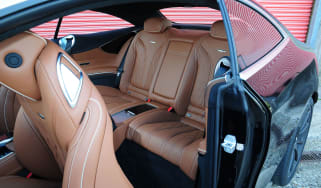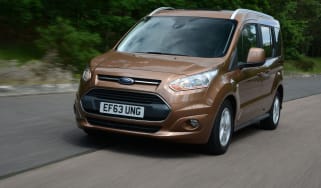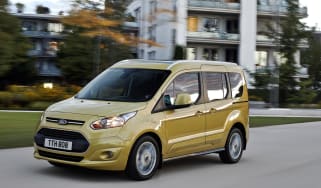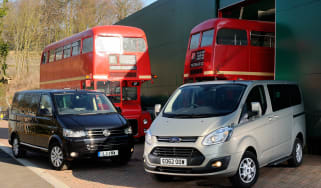Ford Tourneo Connect review
The VW-derived Ford Tourneo Connect people carrier is highly practical and now comes as a plug-in hybrid

Our opinion on the Ford Tourneo Connect
While the Ford Tourneo Connect is a lightly rehashed Volkswagen Caddy, that’s not a bad thing in our eyes. It means it’s based on one of the best platforms in the business, so it can maintain Ford’s tradition of building cars that are entertaining to drive, regardless of the class that they’re in.
Add to that a boxy, van-derived body, and the Tourneo Connect delivers a tempting slice of family motoring. There are five- or seven-seat options available with petrol, diesel or plug-in hybrid drive, although if you want to go electric, you’ll need to look at the similar, but slightly smaller, Ford Tourneo Courier, which shares its platform with an even more entertaining passenger car, the Ford Puma.
| Key specs | |
| Fuel type | Petrol, diesel, plug-in hybrid |
| Body style | Five-door, five- or seven-seat van-based MPV |
| Powertrain | 1.5-litre turbo petrol, front-wheel drive 1.5-litre turbo petrol, plus 1x electric motor, front-wheel drive 2.0-litre diesel, front-wheel drive |
| Safety | Five-star Euro NCAP (2021) |
| Warranty | Three years/60,000 miles |
About the Ford Tourneo Connect
The Ford Tourneo Connect slots between the Courier and Custom in Ford’s van-based MPV line-up. The Tourneo name originated from the mid-Nineties, when the passenger-carrying version of the facelifted second-generation Transit arrived, and since then it has been used to signify all of Ford’s passenger vans, so the three models above sit alongside the Ford Transit Courier, Connect and Ford Transit Custom ranges – currently there’s just a Minibus version of the largest Transit.
While the Tourneo Courier and Custom are wholly Ford projects, the Connect version is the product of Ford and Volkswagen’s technical partnership that has also introduced VW-derived models such as the Ford Explorer and Ford Capri. The Tourneo Connect is based on the same platform and bodyshell as the VW Caddy small van, but it has been given a Ford nose that has similarities with the Ford Kuga family SUV.
The Tourneo Connect comes in petrol, diesel and plug-in hybrid guises, all of which are VW-derived powertrains, while there are Tourneo and Grand Tourneo variants on offer. The differences are that the Grand model has a longer wheelbase and seven seats inside.
Used - available now

2021 Ford
Tourneo Connect
18,392 milesAutomaticDiesel1.5L
Cash £16,850
2021 Ford
Tourneo Connect
6,132 milesAutomaticDiesel1.5L
Cash £19,002
2021 Ford
Tourneo Connect
3,906 milesAutomaticDiesel1.5L
Cash £18,995
2024 Ford
Tourneo Connect
17,800 milesManualPetrol1.5L
Cash £23,999Prices for the Ford Tourneo Connect start from around £35,000, with the Ford Grand Tourneo Connect commanding a premium of around £1,200 on top of that. Switching from petrol to diesel adds roughly £1,200 to the price, while the PHEV is another £1,300 again.
There are Titanium and Active trim levels, both of which are well equipped, with the latter adding SUV-style plastic cladding and diamond-cut alloy wheels to offer more of a ‘lifestyle’ look. Active only comes in diesel and PHEV guises, with prices starting from around £37,000. All versions of the Tourneo Connect are automatic with front-wheel drive.
Performance & driving experience
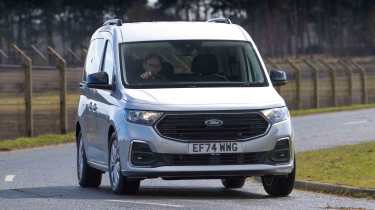
| Pros | Cons |
|
|
There are three powertrain options to choose from in the Ford Tourneo Connect. The range kicks off with a 1.5 EcoBoost unit, which is a rebadge of VW’s 1.5 eTSI mild-hybrid turbo petrol. It makes 113bhp and 220Nm of torque, and is connected to a seven-speed twin-clutch gearbox.
Diesel power comes in the form of a 2.0 EcoBlue unit, which again is a rebadge, this time of VW’s 2.0 TDI motor. It’s tuned to make 120bhp and 320Nm of torque, with the large capacity designed to deliver a less stressful drive than would be offered with a smaller capacity engine. It, too, features a seven-speed twin-clutch auto as standard.
The PHEV is also badged as a 1.5 EcoBoost, but it’s tuned to make 148bhp and 250Nm of torque. It also features a 25.7kWh battery and an electric motor. There’s another automatic gearbox here, but this time it’s a six-speed unit. It still drives the front wheels, though.
All three engines deliver good performance from low revs, with the PHEV packing EV punch before the petrol engine cuts in. The petrol and diesel versions aren’t quite as strong at higher speeds, but deliver a reasonable turn of pace for a car that’s unlikely to be driven particularly hard.
Performance, 0-60mph acceleration and top speed
Ford doesn’t quote acceleration times for the Tourneo Connect in its literature, but Volkswagen provides them for the Caddy. Based on those figures, the 1.5 EcoBoost manages 0-62mph in 11.9 seconds, while the 2.0 EcoBlue dispatches the same benchmark in 11.4 seconds. There are no official figures for the PHEV yet, but with 148bhp on tap, expect a sub-10 second 0-62mph time, even with the extra weight of the drive battery, electric motor and associated running gear.
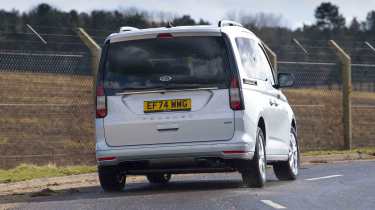
Town driving, visibility and parking
Big windows and an upright driving position boost your view of your surroundings, and the Tourneo Connect’s responsive steering helps with urban driving. We’d like a better response from the throttle, because too often the hesitant automatic gearbox would be left between ratios when a burst of power was needed, when entering a roundabout, for example.
There are front and rear sensors for reassurance when parking, while those sliding side doors reduce the risk of car park dings in tight spaces. The ride is comfortable at lower speeds, courtesy of 17-inch wheels on all models.
The PHEV offers additional refinement courtesy of its silent running when the battery is fully charged. We’d recommend charging it, too, because the overall drive is smoother when the system is switching between electric and petrol power. When the battery is flat, there’s more jerkiness in the system as the petrol motor does all of the work.
B-road driving and handling
On twistier roads, the Tourneo Connect belies its bulky dimensions and offers a surprisingly entertaining drive. The steering is direct and well weighted, while the chassis handles reasonably well, with limited body roll and decent stability in bends.
Acceleration is fine, but the petrol engine runs out of steam at higher speeds, while the diesel sounds a little raucous. Best of the bunch is the PHEV, with the electric motor filling in the power band at lower speeds, and then supporting the petrol engine the faster you go.
Motorway driving and long-distance comfort
At the national limit, the Tourneo Connect is a decent performer that settles into a comfortable ride, although there is a bit more road and wind noise that is amplified a little by the car’s large echo chamber of a body. With seven speeds on offer, the petrol and diesel versions tick along at low revs at 70mph, so engine noise is low.
Expert view, on driving experience
“The Tourneo Connect provides a very fuss-free driving experience, and it handles pretty well for a family MPV. It’s based on the same platform as the Puma SUV, so it has some Fiesta DNA in there.” - Dean Gibson, senior test editor, drove the Ford Tourneo Connect as part of a seven-seater shootout
| Model | Power | 0-62mph | Top speed |
| Tourneo Connect 1.5 EcoBoost | 113bhp | 11.9 seconds | 112mph |
| Tourneo Connect 2.0 EcoBlue | 120bhp | 11.4 seconds | 116mph |
| Tourneo Connect 1.5 PHEV | 148bhp | TBC | 112mph |
MPG & running costs
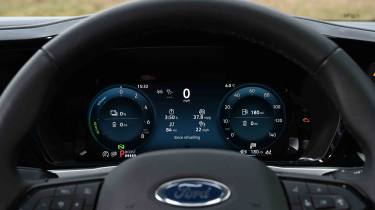
| Pros | Cons |
|
|
Initial prices for the Tourneo Connect start from around £35,000, which is around £10,000 more than some rivals. There’s no basic trim option in the line-up, though, with Titanium and Active specs both featuring plenty of kit as standard.
The best performing model in terms of fuel economy is the PHEV Active, with a WLTP-tested best of 592mpg. That, of course, includes a long stretch of EV running, and when we tested a Titanium PHEV five-seater, we saw a return of around 51mpg over a week of running. This included a full battery charge and then running through half a tank of petrol, with the latter seeing the economy gradually decline as we added more miles.
Much closer to reality are the fuel figures for the petrol and diesel models. The EcoBoost has figures quoted in the region of 40-42mpg, while the EcoBlue diesel is in the 49-50mpg range. We’d expect you to be able to match those figures with steady driving, and if you’re contemplating the PHEV, you really need to keep it charged to justify its extra cost over the other models. As you would expect, the longer and heavier seven-seat Grand Tourneo has poorer fuel figures than the five-seat variant.
| Model | MPG | CO2 | Insurance group |
| Tourneo Connect 1.5 EcoBoost | 41.8mpg | 154g/km | 11 |
| Tourneo Connect 2.0 EcoBlue | 50.4mpg | 147g/km | 13 |
| Tourneo Connect 1.5 PHEV | 589.6mpg | 11g/km | 16 |
Electric range, battery life and charge time
The Tourneo Connect PHEV comes with a 25.7kWh battery that is good for a range of 73 miles in the standard model, or 71 miles in the Grand version, according to Ford’s official figures. That could be enough to do a day’s driving for many people, while having the back-up of the petrol engine will provide the kind of peace of mind that’s not possible in a full EV.
Charging the battery is done via a flap in the nearside front wing, where you’ll find a CCS socket that can take a charging rate of up to 40kW DC. This is able to take the battery from five to 80 per cent capacity in 26 minutes. If you have access to three-phase charging, then an 11kW AC source can charge the battery in two hours and 20 minutes, while a standard wallbox does the job in three hours and 50 minutes.
| Model | Battery size | Range | Insurance group |
| Tourneo Connect 1.5 PHEV | 25.7kWh | 71 miles | 16 |
Insurance groups
As with rival models, the Tourneo Connect’s insurance groups are dictated by the type of powertrain under the bonnet, rather than the trim levels. The 1.5 petrols are in group 11, while the diesels are in group 13 and the PHEVs are even higher, in group 16. There’s no bump in rating if you choose the Grand model over the standard five-seat version, though.
Tax
There are no discounts when choosing a low-emissions model over a standard one these days, so all Tourneo Connects cost the same for road tax. The one exception is the Grand Tourneo Active PHEV, which just breaks the £40,000 list price mark, so it faces the luxury car levy for the first five years of ownership.
Low emissions of 11g/km and 12g/km mean that the PHEV will be a tempting choice for business buyers looking for a car that can double as large family transport. However, if you can cope with a shorter range, electric van-based MPVs from Citroen, Peugeot, Toyota, and Vauxhall offer even greater savings.
Depreciation
Residual values in the 50 per cent region are largely in line with rival van-based MPVs, and are actually around five per cent ahead of the likes of the Citroen Berlingo and Vauxhall Combo Life. However, the seven-seat Dacia Jogger is another 10 per cent ahead of the Ford, and has a lower initial price in the first place.
Interior, design & technology
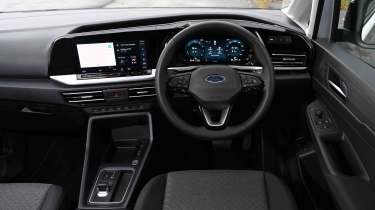
| Pros | Cons |
|
|
From the outside, the Tourneo Connect looks least like the VW Caddy on which it’s based from the front, where a Ford grille and prominent blue oval badge are located. The Active model adds black plastic body cladding to the wheelarches and bumpers, but overall, the rest of the car shares its look with the Caddy, including the interestingly styled rear end.
With plenty of tech carried over from the VW Caddy, there are good and bad points to be found inside the Tourneo Connect, too.
Interior and dashboard design
The dashboard layout is upright, but there’s a panel of gloss-black trim surrounding the touchscreen and dials that’s designed to give it a bit of a lift. Overall, though, the cabin is largely the same as you’ll find in the Transit Connect, with a functional layout that’s ready for work, rather than offering anything stylish.
Materials and build quality
There’s plenty of hard grey plastic on show, but it’s broken up by the gloss-black trim and silver flashes across the dashboard. Another nice touch is the steering wheel. While it’s not trimmed in leather, the man-made Sensico fabric feels similar, and provides an upmarket feel in a class where a lot of van-based MPVs come with plastic steering wheels.
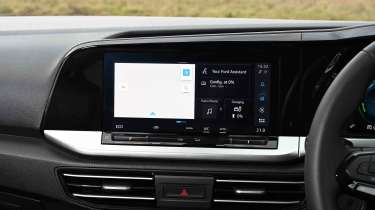
Infotainment, sat-nav and stereo
A decent 10-inch touchscreen and a 10.25-inch digital dashboard are the tech highlights of the cabin. The main screen is fine to use, while most of its functions can be replicated on the driver’s display. For some, this will be easier to use than the main screen, because the multifunction wheel’s assortment of buttons is easier to navigate than the touchscreen itself.
Sat-nav is included, and there’s a 12-month complimentary subscription to connected services, too, while the screen features VW’s operating system, but reskinned with Ford’s graphics. If you can’t get along with this, then Apple CarPlay and Android Auto are included, and they can be wired or wirelessly connected. There are four USB-C sockets on board, two up front and two for the row behind.
Expert view, on design
“Being a van-based MPV means the Tourneo Connect can’t really avoid following function over form. However, the Active trim does at least try to spice things up with a number of rugged additions, giving the car an ‘outdoors adventure’ character.” - Dean Gibson, senior test editor, drove the Ford Tourneo Connect as part of a seven-seater shootout
Boot space & practicality
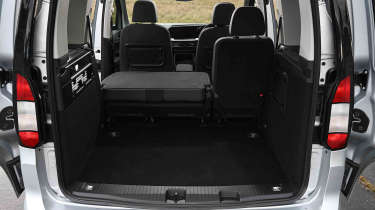
| Pros | Cons |
|
|
With its van roots clearly on show, the Tourneo Connect’s boxy shape helps it to deliver the maximum amount of space possible within its footprint.
Dimensions and size
While the Tourneo Connect is the mid-sized passenger van in Ford’s line-up, the five-seat version is only slightly bigger than the Tourneo Courier, so it might be worthwhile testing both models to see if the smaller car can cater for your needs.
If you need seven seats, then the Grand Connect offers all the room you need, and overall, the Ford is larger than rivals from Citroen and Vauxhall. Obviously, the VW Caddy is a match for the Ford. It’s worth noting that while Active trim adds rugged looks to the mix, the car’s ride height is the same as the Titanium model’s.
| Dimensions | |
| Length | 4,500mm, Grand: 4,853mm |
| Width | 1,855mm |
| Height | 1,856mm (incl roof rails) |
| Number of seats | Five, Grand: seven |
| Boot space | 1,213-2,556 litres, Grand: 446-3,105 litres |
Driving position, seats & space in the front
An upright driving position delivers decent comfort, and you can enhance this by adding optional heated seats with additional comfort and lumbar support for around £720. These features are designed with long-distance drivers in mind, so they should help make every trip comfortable.
Storage up front is good, as you’d expect from a van-based MPV. The glovebox is fine – although a Citroen Berlingo’s is bigger – and the door bins are deep, while a tray ahead of the drive selector is useful for smartphones. There are twin cup-holders next to the drive selector, while the armrest bin is deep.
As with other van-based MPVs, there are overhead trays in the roof above the front seats, while the Tourneo Connect has a wide and shallow storage tray on top of the dashboard. It’s not covered, though, so be careful about what items you keep there.
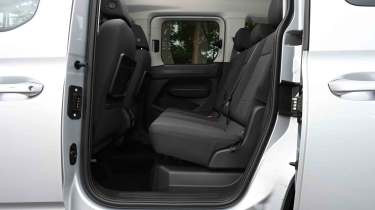
Seats & space in the back
The middle row is spacious, although the central seat isn’t quite as sculpted as the outer chairs. The seats are fixed in place, but there is plenty of legroom and shoulder space, which is helped by the thin doors. Back-seat passengers benefit from twin air vents and a pair of USB-C sockets, while the windows in the doors pop out for ventilation.
The rearmost row is accessed from either side, but you need to fold the middle seatback down and then use another lever to release the seat from the floor, and the stiff controls can make this a bit tricky. Once lifted, there’s plenty of space to get to the back seats and it’s roomy once you’re sat down, too. There aren’t many luxuries here, but there are cup-holders and a storage tray on one side.
Boot space
With its roots in the van world, it would be a big surprise if the Tourneo Connect wasn’t a practical piece of load-carrying kit. There’s up to 3,105 litres of cargo volume in the Grand model, although to take advantage of that you’ll need to remove all five seats. This is easier said than done because they’re quite heavy, especially since the middle row is in a 2-1 configuration. You can always just flip the middle seats forwards, which still gives you a generous amount of space once the two back seats have been taken out.
In five-seat mode, the boot is still vast, and there’s a low floor, too. You’ll have to keep the PHEV’s charging cable in there, though, because there’s no under-floor storage.
Expert view, on practicality
“As well as having a longer body, the Grand Tourneo Connect has an extended wheelbase, too. That makes room for a longer door, which boosts access to the cabin.” - Dean Gibson, senior test editor, drove the Ford Tourneo Connect as part of a seven-seater shootout
Reliability & safety
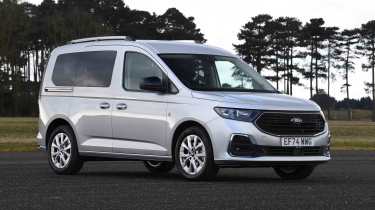
| Pros | Cons |
|
|
There’s plenty of safety kit on board the Tourneo Connect, with features such as autonomous emergency braking, lane assist and speed limit recognition coming as standard. You can deactivate these systems via the touchscreen, although we’d recommend doing it before you drive off, because the menu system can be distracting.
As with other cars in the van-based MPV class, the Tourneo Connect’s five-star Euro NCAP score wasn’t actually achieved by the car itself. Instead, it was a VW Caddy that was tested, but since both cars use the same kit, its score is able to be carried over.
The Ford brand came a disappointing 30th out of 32 manufacturers in our 2024 Driver Power customer satisfaction survey, falling behind Dacia in 22nd place and well below Toyota in an impressive eighth position. Ford owners praise touchscreen visibility, fuel economy and running costs, but weren’t impressed with the quality and reliability of their cars.
| Key standard safety features | Euro NCAP safety ratings |
|
|
Buying and owning
- Best buy: Ford Grand Tourneo Connect 2.0 EcoBlue Titanium
The seven-seater offers the most versatility, while the diesel delivers solid performance and a long range if you need it. If you mostly do urban driving, then we’d consider the PHEV over the diesel.
Ford’s warranty is fairly standard at three years and 60,000 miles, although you can pay extra for an extended warranty of up to five years and 100,000 miles for added peace of mind.
Service intervals for the Ford Tourneo Connect are every two years or 24,000 miles, whichever comes first, and there are tailored service plans available via your local Ford dealer.
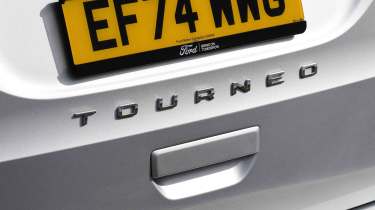
Alternatives
One obvious alternative to the Ford Tourneo Connect is the smaller Ford Tourneo Courier. This uses the same platform as the Puma SUV, so it is good to drive, while an all-electric option is offered. It has good space for a five-seat MPV, but there’s only one body style and no seven-seat option, so it’ll be a non-starter for buyers needing more seats.
The other obvious choice is the Volkswagen Caddy. This has the same engine and body options as the Connect, and it also comes in California camper guise, although that will strictly be for two. Prices are similar between the two, although a slightly different range structure with more basic specs on offer means prices are a bit lower for the VW.
Elsewhere, the only other van-based MPVs that are a similar size to the Ford are the Stellantis offerings, namely the Citroen Berlingo, Peugeot Rifter, Vauxhall Combo Life and closely related Toyota Proace City Verso. Of these, the Berlingo is available in electric, petrol or diesel guises, while the Rifter, Combo Life and Verso are all electric only. They come in five- or seven-seat guises, but aren’t quite as plush as the Ford inside.
Another option if you’re looking for a seven-seater is the Dacia Jogger. It’s the cheapest seven-seat car on sale in the UK, undercutting the Ford by around £10,000, although access and space in the rearmost seats isn’t as good as in these van-based models. But in other areas, it’s good to drive, economical and has plenty of user-friendly touches.
Ford Tourneo Connect pictures
Frequently Asked Questions
Updates to the road tax regime mean that all versions of the Tourneo Connect pay the same rate of road tax. It’s worth noting that the highest spec Active PHEV Grand model breaks the £40,000 mark, so it faces the luxury car tax.
